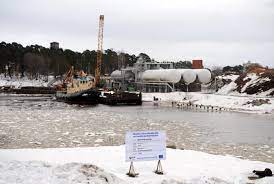
The Latvian government on Tuesday rejected a proposal by the developer of the planned Skulte LNG terminal for state support, leaving the project's future uncertain.
Skulte LNG had told the government that it had found an investor willing to take on the project with its own money, but requested guarantees from the state that would cover potential losses in the first years of operation if the terminal were underutilised, according to Latvian state-owned news outlet LSM.
The climate and energy ministry rejected these conditions on the grounds that the requested guarantees were too large, also factoring in the projected project costs of around €150mn. The state "does not guarantee any profits to any business" and it could itself build the terminal instead, Latvian prime minister Krisjanis Karins said earlier this month.
It is normal for the state to be involved in setting up an LNG terminal, Skulte LNG director-general Renars Mikelsons said, citing the example of the Finnish government's participation in the Inkoo terminal.
If the state were to become involved in the project's construction, it would probably not be completed for five or six years, he said. It is "clear" that the required revenues to make a profit would not be achieved in the first few years and would need to be covered by the state, although these costs could be paid back in later years through reduced tariffs, Mikelsons said. The government should negotiate directly with the potential investor, he said.
When the decision to declare Skulte an "object of national interest" was taken, supply fears were much greater, energy minister Raimonds Cudars said. The minister believes that the terminal's completion date will slip beyond the original deadline of 15 September 2024 because of high global demand for manufacturing of the necessary equipment and a still-uncompleted environmental impact assessment.
In any event, the necessity of the project is in question now as "it seems that Baltic consumption can be met by the terminals that are already in operation", parliamentary secretary of the energy ministry Karlis Sadurskis said. Combined gas consumption in the Baltic states and Finland fell by 40pc in 2022 from the previous year.
The project operator told Argus in November that construction was intended to start in the second quarter of 2023. Since then, prices have gone up and it now looks "challenging to meet the deadline, but we will do our best", the firm told Argus earlier this month, adding that Skulte will still be "the most economical terminal in the region in terms of capital costs, and will provide the most competitive regasification tariff". Skulte LNG is still in talks with potential terminal users.